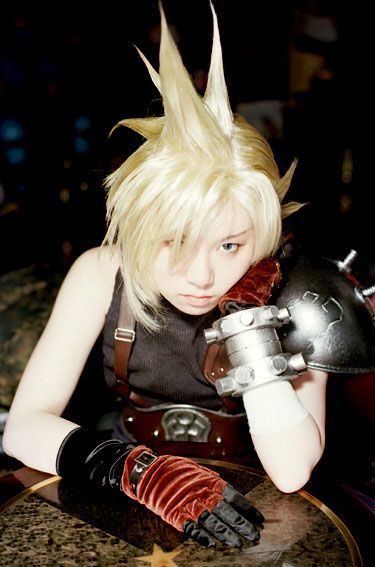Stronger Loving World
A Cultural Criticism WeblogE-Mail Murdervision
Monday, May 30, 2005
Friday, May 13, 2005
Manga Head!
I stumbled onto Garnier's Manga Head from the comments section of
"Take sections of hair, twisting them into defined spikes.
Pull the spikes sideways and across the face for an asymmetric manga style."

On second look, this seems to be the same texture as the wax people put in their hair to dread it. The difference is that people are encouraged to apply it to their hair, flex it into a stiff, flamboyant pose, then dress, act, and feel like a cartoon character. The models on the website look pretty juvenile and pompous, but they also look like they are in their mid twenties, which is surprising as this looks like it would be marketed to fourteen year olds.
I wonder what manga scholar Sharon Kinsella would say about this? Probably:
"The otaku panic also reflects many of the contemporary concerns of social scientists about Japanese society. These are powerful concerns about social fragmentation and the contribution of the mass media and communications infrastructures to this change. Since the 1970s, intellectuals have linked their concerns about the decay of a close-knit civil society to the growth of individualism amongst younger generations of Japanese. Individualistic youth culture has been accurately associated with either the failure or the stubborn refusal of contemporary Japanese to adequately contribute to society, by carrying out their full obligations and duties to family, company and nation. The absorption of youth in amateur manga subculture in the late 1980s and 1990s was perceived by many intellectuals as a new extreme in the alienation of Japanese youth from the collective goals of society. Otaku became another rejuvanated and modernised version of the aging concept of 'youth'..."
"Otaku", literally refers to isolated, disassociated homebodies. I find it kind of romantic that anyone would mass market it. The website plays up the tedium, care, and pure dorkiness of otaku. Wouldn't it be cute if a subculture that represents anomie and fragmentation can flourish, albeit in a ridiculous and patronizing form, as mass market trend? If "pop" is about a uniting, sublime experience diffused through mass media, mutual symbolism and sufficiently pyrotechnic emotional appeals, and that otaku embodies the isolationist or hobbyist with an imaginitive interior world, does this encourage universal disassociation or tolerance for the outrageous psychic worlds we all relax in but fail to adequately locate or locute in casual social experience? Or maybe otaku has nothing to do with anomie at all, but rather grassroots cultural production: " This twilight sphere of cultural production, existing beneath the superstructure of mass communications, (mass commi) became known as the mini communications (mini commi). The structure of Japanese mini commi corresponds closely to the type of Anglo-American fanzine networks described by John Fiske as "shadow cultural economies." Amateur manga and otaku work to produce an autonomous cultural sphere where previously elite information can be distributed to those without the resources to gain cultural capital through traditional outlets. Indeed, "overloaded", flamboyant fashion like this has always struck me as a way of piggybacking large amounts of information into an easily, visibly digestable outlet. The one to one correlation between some otaku enthusiasts and obvious franchise characters (Cloud Stryfe chick above) kind of diffuses this, but a more outrageous, imagine-based stylistic that works on several different levels would enhance the play element of culture, reinforcing the give and take of information as an atmospheric cultural experience rather than the semiotic intoxication that PoMo Joey and Fauxdriald and Theorist X300 from Moon 99 whine about.
Or maybe it's just hair.


